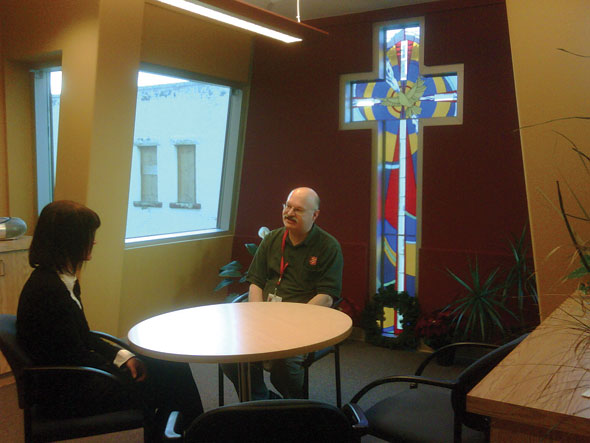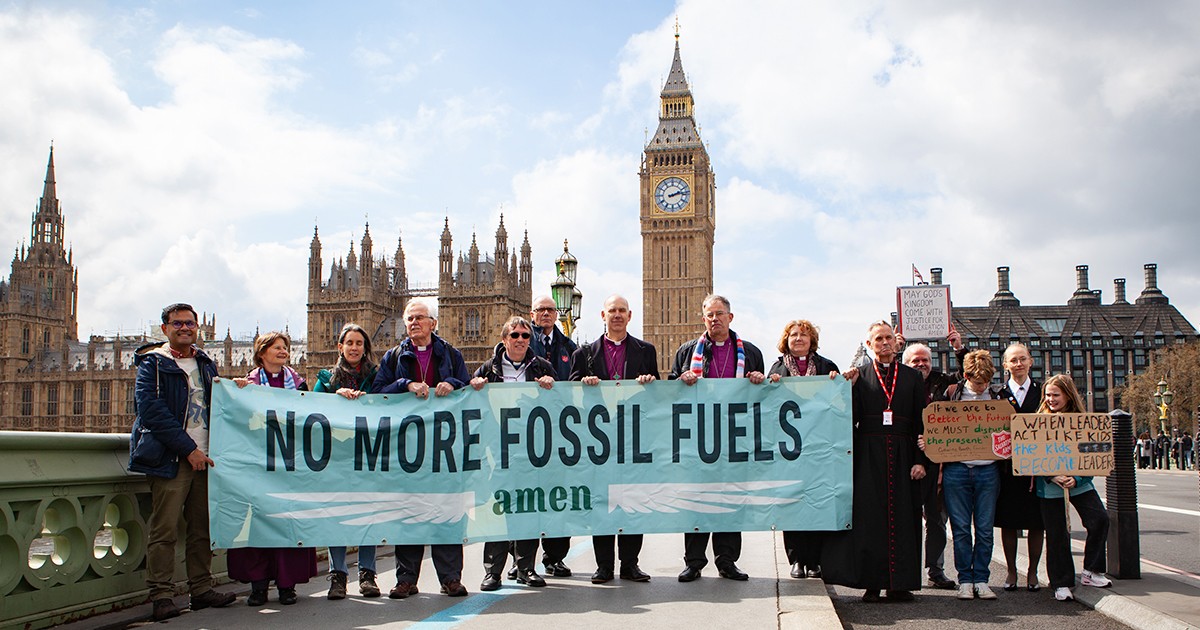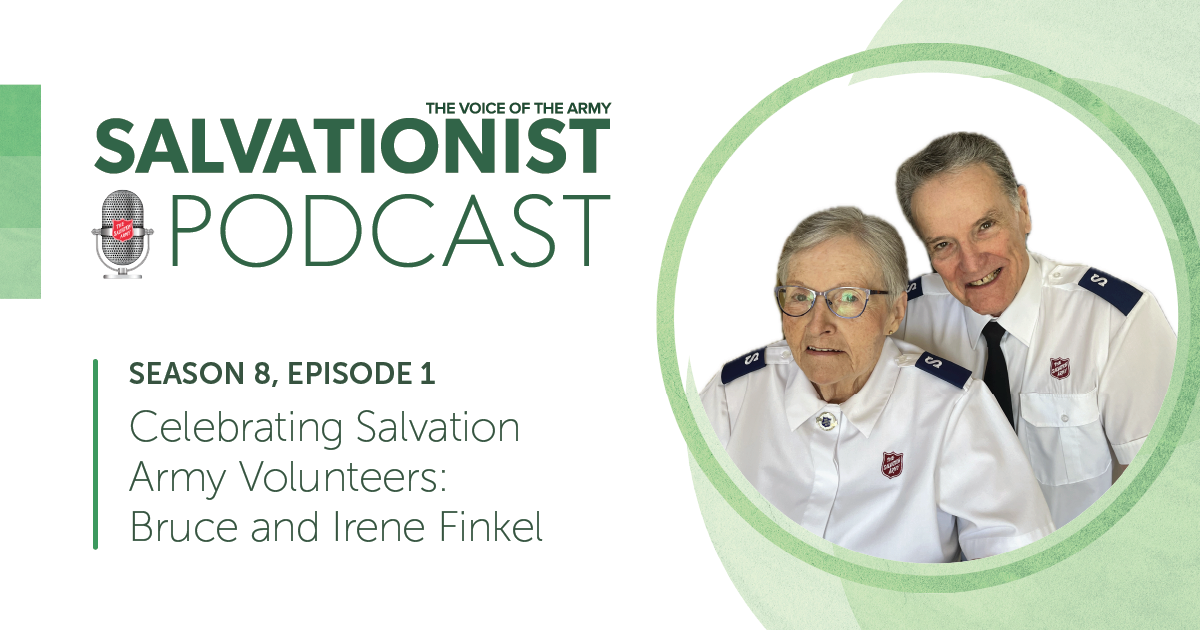
Little Church on the Prairie
The oil boom has made Grande Prairie, Alta., one of Canada's fastest-growing cities. Located in the northwest of Alberta along the route from Edmonton to Fairbanks, Alaska, Grande Prairie's population is young, with an average age of 29.
The Salvation Army Grande Prairie Community Church offers a positive atmosphere. Many new people have started attending the corps in the past year. “Our focus has been on fellowship,” notes Captain Gordon Taylor, corps officer. “We have a monthly lunch and a family fun night. It's a great chance for families to come together and enjoy each other's company.”
The congregation spans generations, from young families with babies to seniors. The corps has a strong junior and senior youth group as well as a youth Bible study.
Five different teams take turns ministering in music for Sunday's church services. There is a contemporary worship team; a gospel team, which features mostly hymns and older music; Volunteers for Christ (VFC), a group of Newfoundlanders; Harmonies, a women's vocal group that performs Gaither music; and a brass band. This rich diversity of musical styles means that if you come to Grande Prairie for a month, each Sunday service will look and sound completely different.
The corps operates two thrift stores, one in Grande Prairie and one in Valleyview, Alta., an hour away. Grande Prairie also has a family services program, a food bank and a soup kitchen. “We are about 30 percent busier this year due to the recession,” says Captain Karen Taylor, community and family services director.
Photo above: Family services workers at Grande Prairie dish up food and friendship

Sharing Mercy at Life's Crossroads
Edmonton Crossroads Community Church (or E3C as it's known) is situated in an Edmonton neighbourhood where there is a high incidence of prostitution, illegal drug exchange and gang activity. Many young families have recently moved in because it is one of the few affordable places to live in Edmonton. E3C is a place of belonging, a place where people are loved for who they are.
Many people who come to E3C are at a crossroads in their lives—a crisis of faith or a crisis of another kind. God has uniquely gifted the church to reach out and exercise his gift of mercy in the community.
High-energy, contemporary church services are held Sunday afternoons at 3 p.m. and an award-winning contemporary Christian band leads in worship.

From the DC's Desk:
The Alberta and Northern Territories Division is diverse and expansive, covering our territory's most northerly appointments and the vast plains of Alberta nestled up against the Rocky Mountains. One can't help but feel that the Psalmist passed this way: “I lift up my eyes to the mountains—where does my help come from? My help comes from the Lord, the Maker of Heaven and earth” (Psalm 121:1-2).
If you could travel with us to Whitehorse or Yellowknife, then down to the challenging work in Fort McMurray, Alta., or the diverse ministry in Edmonton or Calgary, you would see faithful officers, soldiers and employees who work diligently to be a transforming influence in our communities. It is a testament to the work of God and the obedience of his people. My wife, Wendy, and I are pleased to share in leadership in a land resplendent with promise.
—Major Fred Waters, Divisional Commander
For the Friday night street ministry, Salvationists at E3C wear yellow Salvation Army jackets and bring hot chocolate, cold drinks and snacks to people living or working on the streets. They befriend people, letting them know there is a better way. People are always invited to come back to the church for a snack and more conversation.
E3C also runs a daytime drop-in program at the corps building during the week, which serves as a warming centre during the winter. It's a chance to build relationships and offer respite. A community health nurse also visits once a week to change bandages, give flu shots and provide general care. No one is referred to as a “client” but simply a member of the neighbourhood.
Edmonton's first human-trafficking charges were laid in September when police rescued three women who were being held against their will. E3C partners with many community agencies such as the Prostitution Awareness and Action Foundation of Edmonton, which specializes in reaching sexually exploited women and children who are trapped in the sex trade and human trafficking.
Lives are changed when people experience the grace, mercy and love of Jesus. This is not easy work, but it makes a difference.
Photo above: On Friday nights, E3C workers assist those on the streets

Grace in the Golden Years
Edmonton, Alberta's capital city, is home to The Salvation Army's Grace Manor, a seniors' home for 100 residents. Opened in 2002, Grace Manor is an assisted-living facility, meaning that residents live independently, yet receive up to two hours of personalized care per day.
The Salvation Army worked closely with an architect to ensure Grace Manor would provide a home-like atmosphere for its residents, including a lounge in each corridor and carpeting rather than linoleum floors. Groups of 25 gather for large family meals, and staff members at Grace Manor are friendly and warm. There is a sense of community, but residents also are given as much freedom and autonomy as possible.
Grace Manor has a good reputation in Alberta's health community for helping seniors with mental-health challenges, such as schizophrenia and bipolar disorder. The mental-health program is extensive.
“Sometimes residents from small towns on the Prairies who have mental-health episodes go to Edmonton for treatment at a hospital and then are not welcome back in their towns,” explains Major Paul Winsor, executive director. For this reason, many seniors are taken straight from the hospital to Grace Manor, where they can stay as long as they need to. “The number of seniors living with mental-health challenges is increasing,” adds Major Winsor, “and there is already a proposal to construct an addition to our building.”
Quality of life is key to Grace Manor's philosophy. In addition to nursing care, therapeutic recreation is offered, from daily morning exercises to walking clubs to gardening. Pastoral care is also a huge component and particularly helps residents with mental-health issues to remain stable. One-on-one counselling and visitation is available as well as chapel services conducted six days per week.
“Our mission and vision is one of holistic care, and spiritual care is a huge part of that,” concludes Major Winsor.
Photo above: Seniors enjoy activities at Grace Manor

A Stampede on Poverty
Located 300 kilometres south of Edmonton and just east of the Rockies, Calgary is Alberta's largest city. It was the first Canadian city to host the Winter Olympics in 1988, and is home to the famous Calgary Stampede. To cater to the growing needs in Calgary, The Salvation Army has housed all of its social operations under one administrative roof.
Residential housing facilities are run out of Calgary's Centre of Hope and Booth Centre, two buildings in Calgary's Downtown East Village, a neighbourhood notorious for homelessness and drug addiction. Six hundred emergency and transitional-housing beds are available each night, with an additional 120 emergency winter mats to make sure no one freezes outside. Currently, The Salvation Army is working with the city of Calgary on Housing First, a 10-year plan to end homelessness. The plan is to reorganize, move away from emergency shelter and focus on supports that help people find permanent housing.
The Salvation Army already offers many services to the residents of the Centre of Hope and Booth Centre and the surrounding community. There is a computer lab and an employment resource centre where people can get help with resumés, job searches and housing. “We help immigrants connect with services in Calgary and learn basic English,” explains Karen Livick, chief operating officer of the Army's community services in Calgary. “Many people moved to Calgary because they heard how good it was here for work. When they arrived, they encountered massive jobs losses in the oil and gas industries.”
The Army is seeing many new clients come through its doors. The economic downturn has meant that, for the first time in their lives, many parents are unable to provide for their children. Through community support services, families in need are provided with emergency groceries and supported through a rent and utility program. An infant-essentials program helps parents stock up on diapers, formula and cereal for their babies. Children are assisted with backpacks filled with school supplies as well as registration money for recreational sports. At Christmas, 2,300 families (including 4,500 children) are given toy baskets.
Salvation Army corps also get involved on “sock Sundays” and “toque Sundays,” collecting items to give out through community services. Corps such as Calgary's Glenmore Temple send volunteers to prepare school backpacks or Christmas hampers.
The Salvation Army's Pregnant and Parenting Resource Centre is a drop-in program run by a registered nurse and a social worker to help young mothers. Workshops on nutritious cooking and healthy grocery shopping are held in the community at three satellite locations. In addition, the Healthy Families program teaches appropriate child-rearing to new parents who are identified as potential risks for child-welfare involvement. Five caseworkers visit families' homes to coach them in parenting skills, and workshops are held on topics such as family dynamics and shaken-baby syndrome.
“In these times of economic crisis, there is an increased need for Army services. Our staff have stepped up to the challenge, and because of them, thousands of people are being helped,” says Livick.
Photo above: Centre of Hope offers counselling and practical support

FAST FACTS
• Alberta is known for its wide-open spaces—mountains, pristine lakes and sweeping prairie. With a population of over 3,600,000, Alberta is blessed with an abundance of natural resources that drive its agriculture, energy and forestry industries
• The Alberta and Northern Territories Division is comprised of the province of Alberta, the Northwest Territories, Yukon Territory and Nunavut Territory
• There are 20 corps and 16 family services units in the division
• Last year, The Salvation Army in Alberta and the Northern Territories provided 150,000 meals for the hungry
• Army shelters offered 92,843 safe nights for the homeless
• At four rehabilitation centres, 16,798 men and women received treatment for their addictions
• Thousands of clothing items, food hampers and toys were distributed to 95,238 people
• Across the division, 542 people accessed the Army's mental-health services, which provide counselling, life skills and tools for healthy living
• Two assisted-living/long-term care for seniors' homes in Edmonton and Calgary provide 118 seniors an affordable residence with specialized care
• Three community-crisis response units (mobile kitchens) are located in Edmonton, Calgary and Fort McMurray, Alta.
• The Army's Agape Hospice in Calgary provides 18 beds for the terminally ill, giving comfort to residents in their final days and their families
• Excellent summer camping ministries happen at Pine Lake Camp in central Alberta
Click here to read other divisional profiles in this series.









Leave a Comment